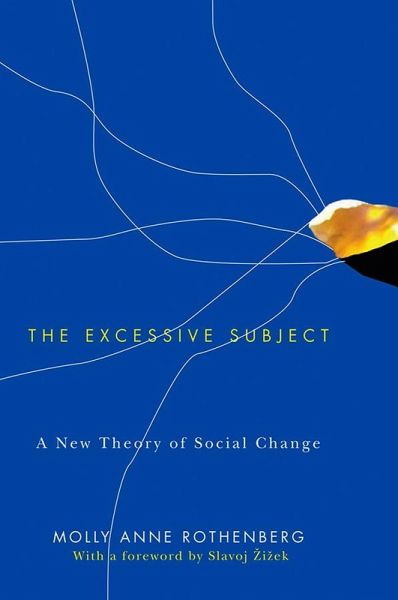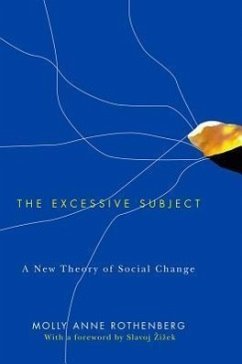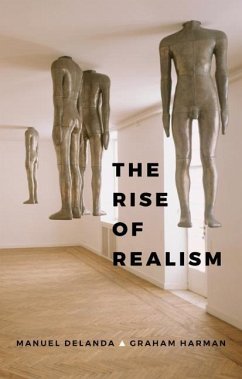
The Excessive Subject
A New Theory of Social Change

PAYBACK Punkte
14 °P sammeln!
In The Excessive Subject: A New Theory of Social Change ,Molly Anne Rothenberg uncovers an innovative theory of socialchange implicit in the writings of radical social theorists, suchas Pierre Bourdieu, Michel de Certeau, Judith Butler, ErnestoLaclau, and Slavoj ?i?ek. Through case studies of these writers work, Rothenberg illuminates how this new theory calls intoquestion currently accepted views of social practices, subjectformation, democratic interaction, hegemony, political solidarity,revolutionary acts, and the ethics of alterity.Finding a common dissatisfaction with the dominant paradig...
In The Excessive Subject: A New Theory of Social Change ,Molly Anne Rothenberg uncovers an innovative theory of socialchange implicit in the writings of radical social theorists, suchas Pierre Bourdieu, Michel de Certeau, Judith Butler, ErnestoLaclau, and Slavoj ?i?ek. Through case studies of these writers work, Rothenberg illuminates how this new theory calls intoquestion currently accepted views of social practices, subjectformation, democratic interaction, hegemony, political solidarity,revolutionary acts, and the ethics of alterity.
Finding a common dissatisfaction with the dominant paradigms ofsocial structures in the authors she discusses, Rothenberg goes onto show that each of these thinkers makes use of Lacan sinvestigations of the causality of subjectivity in an effort tofind an alternative paradigm. Labeling this paradigm extimatecausality , Rothenberg demonstrates how it produces anondeterminacy, so that every subject bears some excess;paradoxically, this excess is what structures the social fielditself. Whilst other theories of social change, subject formation,and political alliance invariably conceive of the elimination ofthis excess as necessary to their projects, the theory of extimatecausality makes clear that it is ineradicable. To imagine otherwiseis to be held hostage to a politics of fantasy. As she examines theimportance as well as the limitations of theories that put extimatecausality to work, Rothenberg reveals how the excess of the subjectpromises a new theory of social change.
By bringing these prominent thinkers together for the first timein one volume, this landmark text will be sure to ignite debateamong scholars in the field, as well as being an indispensable toolfor students.
Finding a common dissatisfaction with the dominant paradigms ofsocial structures in the authors she discusses, Rothenberg goes onto show that each of these thinkers makes use of Lacan sinvestigations of the causality of subjectivity in an effort tofind an alternative paradigm. Labeling this paradigm extimatecausality , Rothenberg demonstrates how it produces anondeterminacy, so that every subject bears some excess;paradoxically, this excess is what structures the social fielditself. Whilst other theories of social change, subject formation,and political alliance invariably conceive of the elimination ofthis excess as necessary to their projects, the theory of extimatecausality makes clear that it is ineradicable. To imagine otherwiseis to be held hostage to a politics of fantasy. As she examines theimportance as well as the limitations of theories that put extimatecausality to work, Rothenberg reveals how the excess of the subjectpromises a new theory of social change.
By bringing these prominent thinkers together for the first timein one volume, this landmark text will be sure to ignite debateamong scholars in the field, as well as being an indispensable toolfor students.













